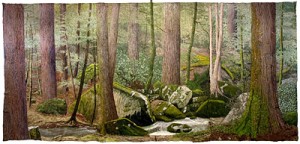The Hemlocks! The Hemlocks!
Story by Jamie Goodman
A striking new art exhibit has captured the life and death of the great eastern hemlock, bringing the plight of this threatened tree to indoor audiences.
Internationally-renowned artist Lowell Hayes, a resident of Valle Crucis, N.C., has created eleven large-scale constructed-canvas paintings that incorporate natural materials such as bark and tree limbs for a striking 3-dimensional representation.
“The exhibition is really not about the blight. [It’s] about the life of the hemlock, rather than the death of it,” Hayes said.
“The Hemlocks! The Hemlocks!” exhibit will show in the Turchin Center for the Visual Arts at Appalachian State University from December 3 through March 19, 2011.
Across the eastern seaboard, a tiny invasive bug is wiping out the mighty hemlock tree. Known as the hemlock woolly adelgid, the pest was first noticed in 1951 near Richmond, Va., and has since decimated evergreen populations from Vermont to Georgia. Unconfirmed reports place the sap-sucking adelgid as far west as Wisconsin.
“Maybe we won’t have a time here in the South when we will be [without] hemlocks, but we already have lost about half of them,” Hayes said.
Hayes has worked on the project for over four years, during which time he experienced the loss of his mother to cancer.
“There I was immersed in the loss of the hemlocks, and [my mother] had cancer and she was not getting any better,” he said. “We knew it was only a matter of time.”
“You don’t sit around and weep with your mother [while she is dying],” he said. “You might have some tears, but when you are with your mother you are trying to contribute to her having a good life so long as she has it.”
Hayes realized he did not want to focus on the death of the hemlocks, but to appreciate the tree while it lives. “What I am painting in the representations and the interpretations of hemlocks is our being with them,” Hayes said.
Hayes, now in his 70s, has been painting the Appalachian landscape and its people for 40 years, but the bas relief hemlock canvases are considered his most evocative and focused work to date. He credits the project with encouraging him to get out in the forest and relate to nature more intimately. “There have been a lot of blessings involved,” he said. “That is a tremendous life experience, and I am very privileged, grateful to be able to do that.”
The ultimate goal of the exhibit is to connect viewers spiritually and emotionally to the plight of this magnificent tree.
“It’s one thing to read about the devastation, or even to go into the field and observe it, but it’s another… to have an artist’s take on how you feel when you are with these hemlocks,” he said. “I hope this does get a chance to [create] contact between people and hemlocks, especially between people in urban situations who don’t get into the forest very much.”
Viewing the massive paintings first-hand is a study in nature itself. Tree limbs, constructed moss and rocks, and sections of real hemlock bark loom off the canvas in realistic detail. The sheer size—the largest is 9 feet high by 19 feet long—dwarfs the viewer.
During the exhibition, the art will be complimented by a range of educational materials about the woolly adelgid and the demise of the hemlocks.
A two-story exhibition hall will also house a site-specific installation by Hayes that includes a nearly 40-foot section of a dying hemlock tree.
Hayes hopes to take the show on tour after the Turchin exhibition, and is seeking venues throughout the hemlock range, from Maine to Alabama and west to Minnesota.
“The finest thing that anyone says to me about my work is, ‘After seeing your work, I saw what you mean [out] in nature,’” he said. “I like to say, ‘This is heaven, don’t miss it while you’re here.’”
Work by Lowell Hayes has been included in a touring exhibition by the National Museum of American Art and graces numerous private and public collections, including the University of North Carolina and the Tennessee State Museum.
The Turchin Center for the Visual Arts is located at 423 W. King Street, Boone, N.C., and is open Tuesday through Saturday. Admission is free.
Related Articles
Latest News

Leave a comment
Your email address will not be published. Required fields are marked *






Leave a Comment